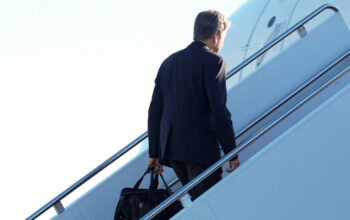
President Vladimir V. Putin’s approval ratings have reached levels unseen in years, according to an independent poll released on Thursday, as many Russians rally around the flag in the face of mounting international pressure.
Eighty-three percent of Russians said they approved of Mr. Putin’s actions, up from 69 percent in January, according to a poll by the Levada Center, an independent pollster in Moscow. Ratings of many other government institutions, as well as the ruling party, have also gone up, the poll indicated.
While some observers believe polls in Russia do not reflect public opinion accurately, with many people giving answers they believe are socially acceptable, most agree that they are useful in gauging the dynamics of people’s moods. The poll by Levada — which has been declared a “foreign agent” in Russia — was conducted among more than 1,600 people across the country, with the margin of error not exceeding 3.4 percentage points.
Denis Volkov, Levada’s director, said that initial feelings of “shock and confusion” that many Russians felt at the start of the Feb. 24 invasion of Ukraine is being replaced with the belief that Russia is besieged, and that its people must rally around their leader.
“The confrontation with the West has consolidated people,” Mr. Volkov said, adding that some respondents said that while they generally do not support Mr. Putin, now is the time to do so.
According to that line of thinking, he said, people believe that “everyone is against us” and that “Putin defends us, otherwise we would be eaten alive.”
Many Russians live in a world, as presented by state-run media, where there is no war with Ukraine. Instead, their country is carrying out “a special military operation” to uproot far-right extremists in a brotherly country that went off track, and has been pushed by Western countries to turn against Moscow.
The Kremlin has also moved to silence most independent media in Russia, forcing some to flee or suspend operations, and others to self-censor.
Mr. Volkov compared the prevailing mood in Russia to the aftermath of the annexation of Crimea in 2014, although he said the national feeling today is much darker.
“There is no euphoria because this time the situation is much more serious and difficult, he said. “There are victims, and it is unclear when it will all end.”

